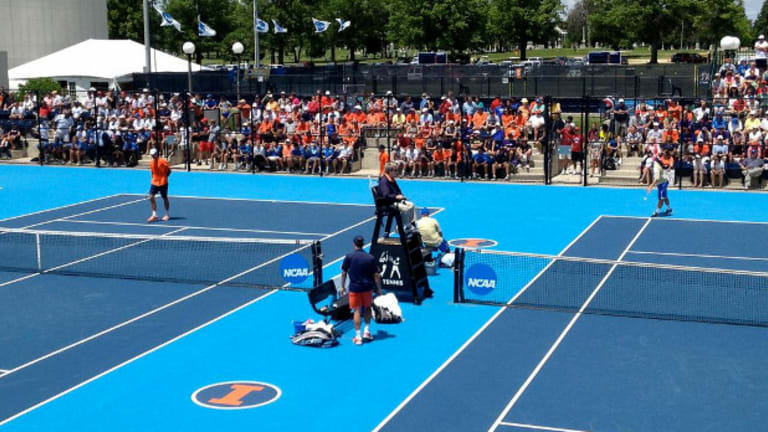Billy Martin (Head Coach, UCLA): The finals of an NCAA Championship has a special feeling. Tension. Nervousness. Anxiety.
Colette Lewis (Journalist and founder of ZooTennis.com; has covered college tennis since 2000): There have been many 4-3 national final matches, so I was expecting a close match, but with sports you’re never quite sure.
Brian Boland (Head Coach, University of Virginia): The team felt like we were playing our best tennis of the year. Being around the guys in the locker room that day, I certainly did feel an extra step of confidence or swagger.
Martin: Each one feels a little different. You have a different group of guys every time, so you just don’t know, in that big a forum, in that big a moment, how they’re going to handle the pressure.
Adrien Puget (No. 3 Singles Player, UCLA): We hadn’t played Virginia during the season, so we didn’t know what to expect from them. We didn’t know how they would play or how they would react under pressure, stuff like that.
Boland: We have a very detailed routine that we go through during the week. We walked together to breakfast as a team, which we did every morning. We have some superstitious guys on our team, so whatever that restaurant is, if it works the first day, then, oh boy, we’re there the rest of the way.
Mitchell Frank (No. 3 Singles Player, University of Virginia): I remember that morning I had a weird feeling that the match was going to come down to me. I was playing out scenarios in my head, seeing myself as last guy on the court, battling for my team, trying to come though.
Martin: Our team was pumped up. As you win matches, from the round of sixteen to the quarters, its building up. There’s a real excitement. You can see the intensity. You kind of wish you could bottle it from a coaching standpoint, and have them working that hard the entire year.
Lewis: I think the interesting story behind this one was just the history of Virginia being unable to get over that hump. Having lost 4-3 and 4-2 the previous two years, both to USC. And they’d had great, great teams in the past, and were heavy favorites in many of the years they reached the final four.
Boland: We had a bus that took us each day to the site, so we spent a lot of time kind of talking as a team. That was my time to address anything I wanted to discuss with the team, and I certainly did the morning of the final.
Frank: Usually our team is very talkative and loose, but that morning, everyone was quiet. We knew there was business to take care of. We’d been here so many times but hadn’t gotten it done. It wasn’t something we really ever discussed, but it was in our heads.
!Boland: One of my biggest jobs last year was taking the pressure off. These kids were feeling the weight of our history. And whether I believed that or not, it was true. There were moments where I would try and convince myself that it didn’t play a role, but we knew it was an issue. We’d been so close so many times and there’d been so much talk about it.
Lewis: There was getting to be the sense that Virginia was going to be a perennial bridesmaid and that something was going to happen this year that would keep them from winning yet again.
Boland: Reaching six final-fours and two finals. Losing the last match on in 2011, being way up in No. 6 singles and serving for it at No. 5, either which would have won it all for us in 2012. I think the team itself felt a certain amount of pressure to bring home a national championship to Charlottesville.
Puget: Our team tried to approach the match with exactly the same routine we had for the whole tournament. We were well-prepared, I think.
Boland: I also didn’t want it to be about me. I started this program 13 years ago, and we’d had some tough losses, but I told them today was about them. These kids only get four shots at it.
Puget: Coach said a few words before in the locker room. Trying to take the pressure off. To remember that it’s just a tennis match and to have fun. To just play our game and enjoy it while we’re out there.
Martin: I was anxious to see how the guys would perform under that kind of pressure, with everything on the line, trying to achieve the ultimate goal.
Boland: No one could have predicted it would come down the way it did. This time it fell our way.
Frank: I just remember having that vision of the match coming down to me.
The NCAA tournament can often be exciting, rowdy, and totally unpredictable. For the first time, it was held in Urbana-Champaign, Illinois, on the campus of the University of Illinois.









